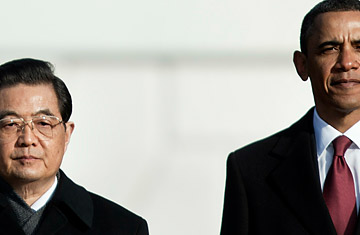
US President Barack Obama, right and Chinese President Hu Jintao.
Hu Jintao has a lot to be happy about. His state visit to Washington this week, the first by a Chinese leader since then-president Jiang Zemin came in 1997, was free of the blunders that plagued his lower-key "official" visit to the White House in 2006, when Hu's speech was interrupted by a protestor from the Falun Gong spiritual movement, and China's national anthem was introduced as that of the Republic of China, the official name for Taiwan.
This time the most public flub was when Hu initially ignored an American reporter's question about human rights in China, only to be asked again to answer the question by another American reporter. Hu finally replied with an admission that "a lot still needs to be done in China, in terms of human rights," which was not the revelation that it was first made out to be in U.S. press coverage of the exchange. China's most recent official white paper on human rights, which was released last year, contained a very similar line. And when Chinese leaders speak of upholding human rights, they focus more on livelihood issues such as lifting people from poverty and less on freedoms such as speech and religion.
Hu's initial ducking of the human rights question will mean little back home. In the few Chinese outlets that covered Hu's hesitation during the press conference, like the web site of the Global Times, a tabloid run by the Communist Party mouthpiece People's Daily, Hu's delay was blamed on a translation error.
Instead, Hu's first state visit to the U.S. has been heralded as an unmitigated success on the front pages of China's newspapers and during lengthy state-run television broadcasts. Images of a stiff Hu smiling next to President Obama, solemnly reviewing an honor guard, greeting flag-waving children and being toasted at a state dinner all convey the image that the U.S. — and the rest of the world, — now recognizes China's status as a confident, rising power. As the Global Times put it in a banner headline Thursday: "U.K. media calls China and U.S. 'on equal footing.'"
Despite the triumphalism in the Chinese media, the tone that average citizens expressed was much more equivocal. On blogs, message boards and Twitter-like services such as Tencent Weibo, many approved of Hu's welcome in the U.S. and cheered his apparent success. But others questioned the fanfare and asked whether, despite the recognition Hu received in Washington, China has truly achieved superpower status.
During the visit, the White House announced that China approved $19 billion to buy 200 Boeing passenger jets, part of a package of $45 billion in trade deals sealed over Hu's trip. Those contracts, which the White House says will support an estimated 235,000 American jobs, could aid Obama in making his case that amid much American uncertainty of China's rise, China's economic success can also help the U.S. Still, the benefits may be overstated. A report from the Seattle Times says the Boeing deal wasn't for new airplane sales, but rather marked Beijing's approval of deals that "were announced and booked by Boeing as firm orders over the past four years," and that the actual value of the jets was closer to $11 billion.
In China, the package of deals prompted a different set out doubts. Online some Chinese commentors questioned why exactly China needed to spend so much on official trips abroad. "You can't buy true friends with money," wrote one user on Tencent Weibo. "You can't feed the wolf full if you feed him your own flesh. Chinese people, why don't you feed yourself full first!" Another writer on Tencent Weibo cited Hu's visit to France last year, when China's purchase of 102 Airbus jets for $14 billion, in addition to another $9 billion in other deals, were announced. "When you visit Europe, you spend several billions in Airbus," wrote the user, who went by the pen name Brown. "Now you visit the U.S., and you spend another several billion in Boeing. Why take the trouble visit them? You could just transfer the money."
A prouder theme that emerged in the online criticism was that the warm welcome for Hu and the positive turn in ties was a result of the needs of the U.S. — not China. With the U.S. suffering from stagnating economic growth and lingering high unemployment, it is desperate for trade and investment from China, which managed to weather the financial crisis without nearly as much pain. "America only stays friendly with us when they need us," wrote another user on Tencent Weibo. "When they don't need us, they would suppress us. Why can't China remember that?" For Hu, it's a reminder that success abroad doesn't always translate into gains at home.
— With reporting by Chengcheng Jiang
